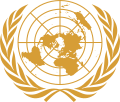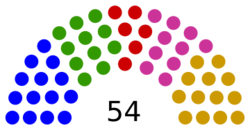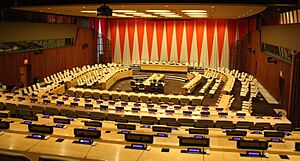United Nations Economic and Social Council facts for kids
Quick facts for kids United NationsEconomic and Social Council |
|
|---|---|
 |
|
| History | |
| Founded | 26 June 1945 |
| Leadership | |
|
President
|
|
| Structure | |
| Seats | African states (14)
Asia-Pacific states (11) Eastern European states (6) Latin American and Caribbean states (10) Western European and other states (13) |
 |
|
| Meeting place | |
 |
|
| United Nations Economic and Social Council chamber at United Nations headquarters | |
The United Nations Economic and Social Council (ECOSOC) is one of the six main parts of the United Nations. It helps coordinate the UN's work on economic and social issues. This includes overseeing 15 special agencies, 8 functional commissions, and 5 regional commissions.
ECOSOC is a key place for discussing global economic and social topics. It also creates ideas and suggestions for UN member countries and the wider UN system. It has 54 member countries. More than 1,600 non-governmental organizations (NGOs) also work with ECOSOC. They help by sharing their ideas and experiences.
ECOSOC holds a four-week meeting every July. Since 1998, it has also met yearly in April with finance ministers from the World Bank and the International Monetary Fund (IMF). The High-level Political Forum on Sustainable Development (HLPF) also meets under ECOSOC's guidance each July. This forum checks how countries are doing with the 2030 Agenda for Sustainable Development.
ECOSOC members help choose the leaders for important groups like UNICEF, the United Nations Development Programme, and UNHCR. They also review and update the UN's list of least developed countries.
Contents
Leading ECOSOC
The President's Role
The President of ECOSOC is chosen for a one-year term. This person is usually from a small or medium-sized country that is part of the Council. The presidency rotates among different United Nations Regional Groups. This makes sure all regions get a fair chance to lead.
Current President
His Excellency Bob Rae was chosen as the eightieth President of the Economic and Social Council. He began his term for the 2025 Session on July 25, 2024. Before him, Paula Narváez from Chile was the seventy-ninth president for the 2024 Session.
ECOSOC Members
How Members Are Chosen
The Council has 54 member countries. The United Nations General Assembly elects these countries each year. They serve for three-year terms that overlap. Seats are given out fairly among the different UN regional groups. Countries can be re-elected right away. Some countries are almost always members.
A Look Back at Membership
When the United Nations Charter was first signed in 1945, ECOSOC had 18 seats. Over time, as more countries joined the UN after decolonization, the number of seats grew.
In 1965, the Charter was changed to increase ECOSOC to 27 seats. The regional groups were officially set up then. In 1973, the Charter was changed again, and ECOSOC grew to its current size of 54 seats.
Current Member Countries
Here are the countries that are currently members of ECOSOC:
| Term | African States | Asia-Pacific States | Eastern European States |
Latin American & Caribbean States |
Western European & Other States |
|---|---|---|---|---|---|
| 2025 – 2027 | |||||
| 2024 – 2026 | |||||
| 2023 – 2025 | |||||
| Total Countries
54 |
14 | 11 | 6 (currently 5, 1 vacant) | 10 | 13 |
Other Organizations Working with ECOSOC
Many other organizations, like inter-governmental groups, also work with ECOSOC. Some participate all the time, while others join for specific projects. These groups help ECOSOC by sharing their knowledge and working together on global issues.
ECOSOC Commissions
ECOSOC has different commissions that focus on specific areas.
Functional Commissions
These commissions deal with particular topics:
- Commission on Narcotic Drugs (CND)
- Commission on Population and Development (CPD)
- Commission on Science and Technology for Development (CSTD)
- Commission on the Status of Women (CSW)
- Statistical Commission (StatCom)
- Commission for Social Development (CSocD)
- Commission on Crime Prevention and Criminal Justice (CCPCJ)
- Forum on Forests (UNFF)
Some commissions have been replaced by new groups over time. For example, the Commission on Human Rights was replaced by the United Nations Human Rights Council in 2006.
Regional Commissions
These commissions focus on economic and social issues in different parts of the world:
- Europe: United Nations Economic Commission for Europe (ECE)
- Africa: United Nations Economic Commission for Africa (ECA)
- Latin America and the Caribbean: United Nations Economic Commission for Latin America and the Caribbean (ECLAC)
- Asia and the Pacific: United Nations Economic and Social Commission for Asia and the Pacific (ESCAP)
- Western Asia: United Nations Economic and Social Commission for Western Asia (ESCWA)
These regional commissions work to improve economic activity in their areas. They also help countries achieve the Sustainable Development Goals (SDGs). This means they look at environmental and social issues, not just economic ones.
Other Groups ECOSOC Oversees
ECOSOC also guides other committees and expert groups. These groups help with things like development policy, human rights, and managing global information.
Specialized Agencies
What They Do
The specialized agencies of the United Nations are independent organizations. They work within the UN system but manage their own activities. They report to ECOSOC, but they have a lot of freedom. Some of these agencies existed before the UN and joined later. Others were created by the UN to meet new needs. Each agency works out its own relationship with ECOSOC.
List of Agencies
Here are some of the specialized agencies that report to ECOSOC:
- Food and Agriculture Organization (FAO)
- International Civil Aviation Organization (ICAO)
- International Fund for Agricultural Development (IFAD)
- International Labour Organization (ILO)
- International Monetary Fund (IMF)
- International Maritime Organization (IMO)
- International Telecommunication Union (ITU)
- United Nations Educational, Scientific and Cultural Organization (UNESCO)
- United Nations Industrial Development Organization (UNIDO)
- United Nations World Tourism Organization (UNWTO)
- Universal Postal Union (UPU)
- World Bank Group (WBG)
- World Health Organization (WHO)
- World Intellectual Property Organization (WIPO)
- World Meteorological Organization (WMO)
Global Challenges and Solutions
In 2011, a UN report called for a large investment in "green technologies." This was to prevent serious environmental problems like global warming and biodiversity loss. The report stressed that using more energy from fossil fuels was pushing Earth's systems to their limits.
UN Secretary-General Ban Ki-moon said that economic growth and protecting the environment should work together. The report concluded that "Business as usual is not an option," meaning changes were urgently needed.
Improving ECOSOC's Work
Why Reforms Are Needed
The way global systems are managed can be very complicated. This has sometimes made it hard for ECOSOC to have a strong impact on international trade, finance, and investment policies. Because of this, there have been efforts to make ECOSOC more effective and important.
Past Reforms
A big change was approved at the 2005 World Summit. The goal was to make ECOSOC a top platform for discussions among member states, financial groups, businesses, and other organizations. It was decided that ECOSOC would hold special meetings to review global development and make sure different aid efforts worked well together.
These meetings also included yearly reviews to check progress on global development goals, like the Millennium Development Goals. Since 2016, these reviews have been replaced by the High-Level Political Forum, especially after the new Sustainable Development Goals were agreed upon.
ECOSOC Chamber Design
A Gift from Sweden
The Economic and Social Council Chamber, located in the United Nations Conference Building, was a gift from Sweden. A Swedish architect named Sven Markelius designed it. He was part of the international team that created the UN headquarters.
Symbolic Design
Wood from Swedish pine trees was used for the railings and doors in the delegates' area. Interestingly, the pipes and ducts in the ceiling above the public viewing area were left uncovered on purpose. The architect believed that anything useful should be visible. This "unfinished" ceiling is a symbol. It reminds everyone that the economic and social work of the United Nations is never truly finished. There will always be more to do to make life better for people around the world.
See also
 In Spanish: Consejo Económico y Social de las Naciones Unidas para niños
In Spanish: Consejo Económico y Social de las Naciones Unidas para niños
- List of organizations with consultative status to the United Nations Economic and Social Council
- International Court of Justice
- UN Trusteeship Council
- UN Department of Economic and Social Affairs
 | George Robert Carruthers |
 | Patricia Bath |
 | Jan Ernst Matzeliger |
 | Alexander Miles |

